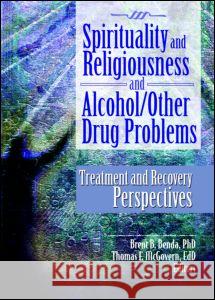Spirituality and Religiousness and Alcohol/Other Drug Problems: Treatment and Recovery Perspectives » książka
Spirituality and Religiousness and Alcohol/Other Drug Problems: Treatment and Recovery Perspectives
ISBN-13: 9780789032997 / Angielski / Twarda / 2006 / 222 str.
An in-depth look at the relevance of religious and spiritual issues to alcohol and drug use and abuse throughout the lifespanSpiritual issues and forgiveness are oft-neglected topics in treatment programs for substance abusers. This unique book brings those underrated components of recovery to the forefront through current research, case studies, and the insight of experts in the field of spirituality as well as drug/alcohol treatment. It illustrates the important interrelationship among religiousness, spirituality, forgiveness, and alcohol and drug use and abuse throughout the lifespan. The contributors examine the effects of religiousness and spirituality on recovery in relation to more widely recognized supports. Each chapter is extensively referenced, and most include tables and/or figures that make difficult information easy to understand and work with.Spirituality and Religiousness and Alcohol/Other Drug Problems: Treatment and Recovery Perspectives draws clear, important distinctions between religiosity and spirituality. It provides you with a clearly laid out conceptual framework for examining the relationship among spirituality/religiousness and alcohol/drug problems, and a theoretical model of forgiveness in regard to alcohol/drug abuse. This informative book also examines: the existing literature on the intersection of spirituality/religiousness and alcohol/drug issues addiction recovery across the lifespan connections among stress, quality of life, social support, spirituality and religiosity, and recovery how social supports, spirituality, religiousness, life meaning, and affiliation with 12-step fellowships affect the quality of life for people in recovery evidence-based forgiveness treatment alcohol abusers' traits and how abusers function in the context of family Christian perspectives on alcohol/drug use and abuse--with a chapter devoted to Protestant perspectives and treatment implications predictors of rehospitalization for homeless substance abusers, including spiritual well-being various dimensions of religious involvement and mental health outcomes among addicted women whether religiousness, as opposed to church attendance, is related to alcohol/drug consumption and delinquency the ties between religious variables and mental health in a high-risk population (chemically dependent pregnant or parenting women in a residential treatment program) . . . and a great deal moreThis book is designed to be immediately useful to practitioners (social workers, psychologists, psychiatrists, counselors, and ministers) who work with substance users and abusers, as well as to academicians and researchers involved with these topics. Please consider adding it to your professional, research, or teaching collection today











